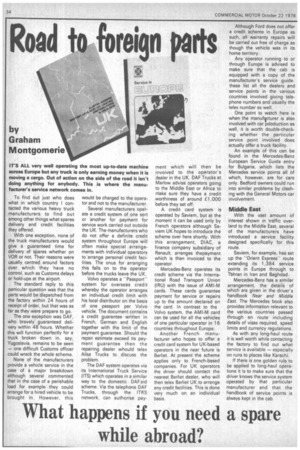Road to foreign
Page 36

If you've noticed an error in this article please click here to report it so we can fix it.
IT'S ALL very well operating the most up-to-date machine across Europe but any truck is only earning money when it is moving a cargo. Out of action on the side of the road it isn't doing anything for anybody. This is where the manufacturer's service network comes in.
To find out just who does what in which country I contacted the various heavy truck manufacturers to find out among other things what spares delivery and credit facilities they offered.
With one exception, none of the truck manufacturers would give a guaranteed time for delivery of spares whether on VOR or not. Their reasons were usually centred around factors over which they have no control, such as Customs delays or hold-ups at the airport.
The standard reply to this particular question was that the parts would be dispatched from the factory within 24 hours of receipt of order, but that was as far as they were prepare to go.
The one exception was OAF, who bravely guaranteed delivery within 48 hours. Whether this will function perfectly for a truck broken down in, say, Yugoslavia, remains to be seen — one difficult Customs officer could wreck the whole scheme.
None of the manufacturers provide a vehicle service in the case of a major breakdown although several commented that in the case of a perishable load for example they could arrange for a hired vehicle to be brought in. However, this would be charged to the operator and not to the manufacturer.
Several manufacturers operate a credit system of one sort or 'another for payment for service work carried out outside the UK. The manufacturers who do not offer a definite credit system throughout Europe will often make special arrangements with individual operators to 'arrange personal credit facilities. The onus for arranging this falls on to the operator before the trucks leave the UK.
Volvo operates a "Passport" system for overseas credit whereby the operator arranges an individual credit limit with his local distributor on the basis of one passport per Volvo vehicle. The document contains a credit guarantee written in French, German and English together with the limit of the payment guarantee. Should the repair estimate exceed tis payment guarantee then the repairing dealer whould telex AiIse Trucks to discuss the problem.
The OAF system operates via its International Truck Service (ITS) which operates in a similar way to the domestic OAF aid scheme. Via the telephone OAF Trucks, through the ITRS network, can authorise pay
ment which will then be .invoived to the operator's dealer in the UK. OAF Trucks at Marlow advise operators going to the Middle East or Africa to make sure they have a credit worthiness of around £1,000 .before they set off.
A credit card system is operated by Saviern, but at the moment it can be used only by French operators although Saviem UK hopes to introduce the scheme over here shortly. With this arrangement, DIAC, a finance company subsidiary of Renault, arranges thepayment which is then invoiced to the operator.
Mercedes-Benz operates its credit scheme via the International Road Transport Union (IRU) with the issue of AMI-M cards. These cards guarantee payment for service or repairs up to the amount declared on the card. In contrast to the Volvo system, the AMI-M card can be used for all the vehicles of one particular operator in 16 countries throughout Europe.
Another French manufacturer who hopes to offer a credit card system for UK-based operators in the near future is Berliet. At present the scheme applies only to French-based companies. For UK operators the driver should contact the nearest Berliet dealer, who will then telex Berliet UK to arrange any credit facilities. This is done very much on an individual basis. Although Ford does not offer a credit scheme in Europe as such, all warranty repairs will be carried out free of charge as though the vehicle was in its home territory.
Any operator running to or through Europe is advised to make sure that the cab is equipped with a copy of the manufacturer's service guide. these list all the dealers and service points in the various countries involved giving telephone numbers and usually the telex number as well.
One point to watch here is when the manuficturer is also involved with car pdoduction as well, it is worth double-check, ing whether the particular service point involved does actually offer a truck facility.
An example of this can be found in the Mercedes-Benz European Service Guide entry for Bulgaria, which lists the Mercedes service points all of which, however, are for cars only. Bedford owners could run into similar problems by clashing with the General Motors car involvement
Middle East
With the vast amount of interest shown in traffic overland to the Middle East, several of the manufacturers have introduced a service facility designed specifically for this route.
Saviem, for example, has set up the -Orient Express" route extending its 1,384 service points in Europe through to Tehran in Iran and Baghdad.
Mercedes-Benz has a similar arrangement, the details of which are given in the driver's handbook Near and Middle East. The Mercedes book also provides information relevant to the various countries passed through en route including details of visas required, speed limits and currency regulations.
As with any long-haul route it is well worth while contacting the factory to find out what service is available — especially on runs to places like Karachi.
If there is one golden rule to be applied to long-haul operations it is to make sure that the driver knows the service system operated by that particular manufacturer and that the handbook of service points is always kept in the cab.




























































































